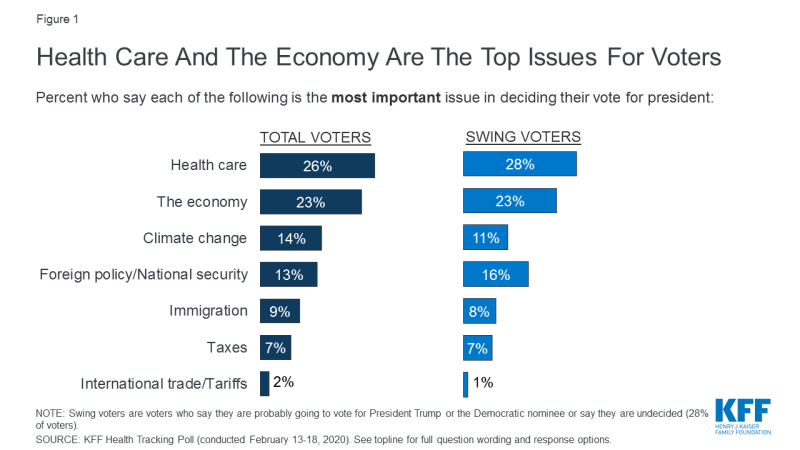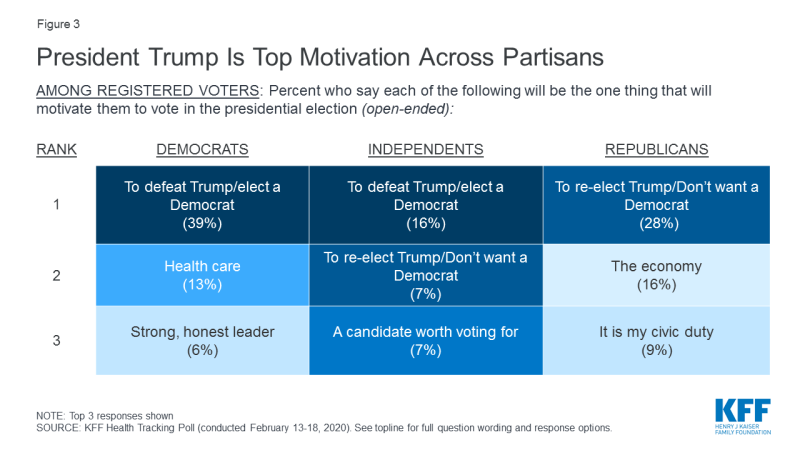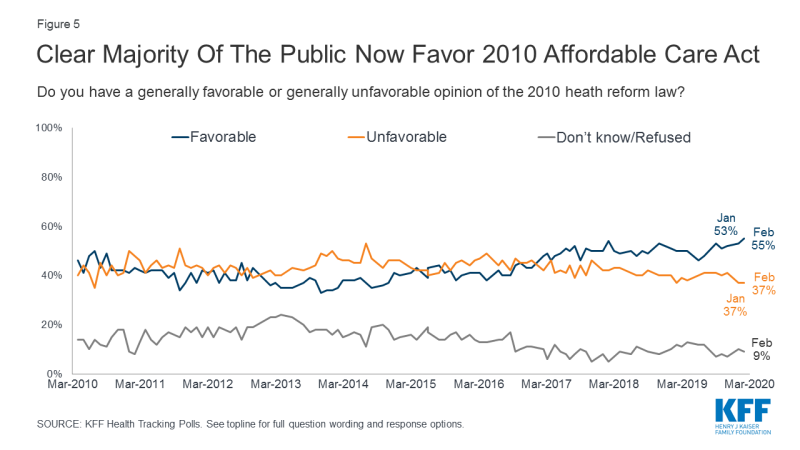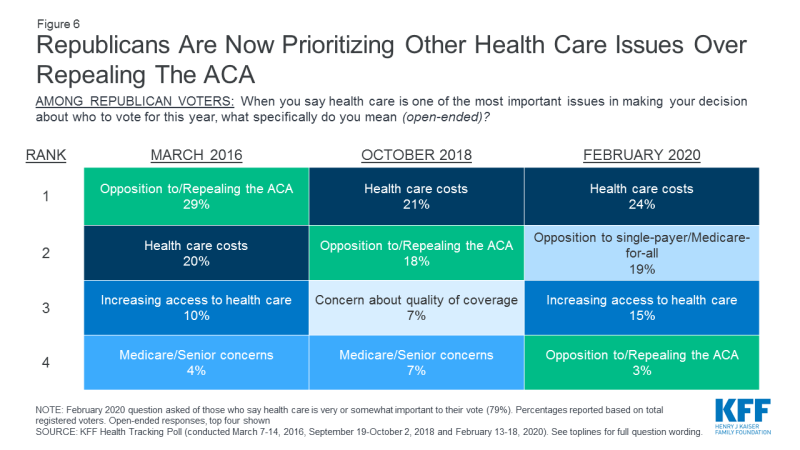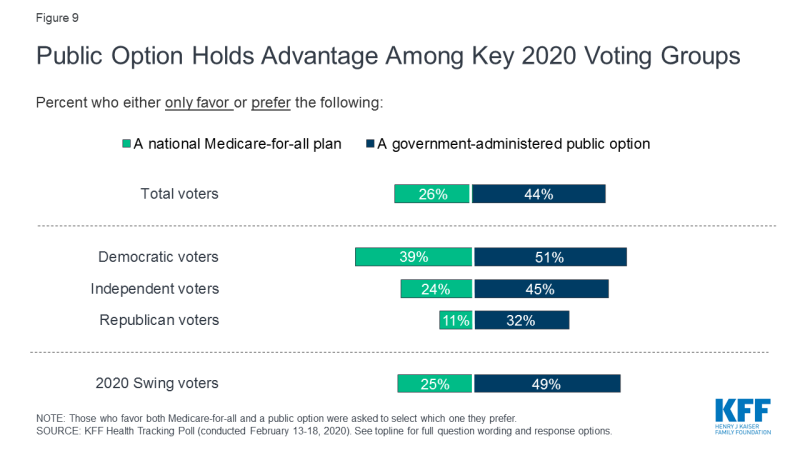KFF Health Tracking Poll – February 2020: Health Care in the 2020 Election
Key Findings:
- The U.S. Supreme Court will decide today whether to take up Texas v. United States, which challenges the constitutionality of the 2010 Affordable Care Act (ACA). The February KFF Health Tracking Poll finds attitudes towards the ACA has hit its highest favorability since KFF began tracking opinions nearly ten years ago. The latest KFF poll finds a clear majority of the public viewing the law favorably (55%), while slightly more than one-third (37%) of the public hold unfavorable views.
- The Affordable Care Act took center stage in the Nevada Democratic presidential debate with Vice President Biden attacking Mayor Bloomberg’s record on the ACA. Nearly nine in ten Democrats (85%) and Democratic voters (86%) view the ACA favorably and while most Republicans view the unfavorably, significantly fewer Republicans offer repealing the 2010 health reform law as their top health care issue. Voters, overall, and across party identification, prioritize other health care issues such as health care costs.
- Health care remains a top issue for Democratic voters, independent voters, and the crucial group of voters who haven’t made up their minds yet – swing voters. More than one-third of Democratic voters (36%) say health care is the “most important” issue in their 2020 vote choice as do three in ten independent voters and 28% of swing voters. Yet, when asked what is the one thing that will motivate them to vote in 2020, a larger share of voters offer responses related to defeating President Trump and electing a Democrat than any issue, including health care. When voters who have decided to vote for the Democratic nominee are asked what is most important when choosing a Democratic candidate, a larger share say “a candidate with the best chance to defeat President Trump” (59%) than one “who comes closest to your views on issues” (39%).
- Both a national Medicare-for-all plan and a government-administered public option continue to garner majority support in the KFF Health Tracking Polls, including large shares of Democrats who express positive attitudes towards both proposals. Yet, the public option holds the advantage over a national Medicare-for-all plan when supporters of both are forced to choose one. The public option garners more support among many key groups in the 2020 Democratic primary including swing voters (49% v. 25%).
Health Care Among Top Issues for Voters, But Trump Looms Large
More than eight months before the 2020 general presidential election, health care (26%) and the economy (23%) are the top issues that registered voters say will be most important in deciding their vote for president. This is followed by climate change (14%), foreign policy (13%), immigration (9%), taxes (7%), and international trade and tariffs (2%).
Health care and the economy are also the top issues for these 2020 swing voters, with similar shares saying each is the most important issue in determining their vote choice (28% and 23%, respectively). A previous KFF analysis of swing voters along with The Cook Political Report found that swing voters give Democrats the advantage on health care while President Trump has the advantage on the economy.
Swing Voters
A majority of voters have already decided who they plan on voting for in the 2020 presidential election with nearly three in ten voters (28%) saying they are “definitely going to vote for President Trump” and four in ten (39%) saying they are “definitely going to vote for the Democratic nominee.” Yet, there is a crucial group of voters, “swing voters,” who have not made up their minds yet. When asked how they plan to vote in 2020, about three in ten (28%) registered voters either say they are either “undecided” (7%) or “probably going to vote for President Trump” (10%) or “probably going to vote for the Democratic nominee” (11%), but haven’t made up their minds yet.
More than one-third (36%) of registered voters who identify as Democrats say health care is the most important issue in deciding who they will vote for in 2020 while 29% say climate change is the most important issue, which is consistent with how N.H. Democratic primary voters prioritized these issues. Health care (30%) and the economy (24%) rank as the top issues for independent voters, while the economy (34%) is the top issue for Republican voters.
| Table 1: Top Issues For Voters By Party Identification | |||
| Percent who say each of the following is the most important in deciding their vote for president: | Democratic voters | Independent voters | Republican voters |
| Health care | 36% | 30% | 12% |
| Economy | 14 | 24 | 34 |
| Climate change | 29 | 7 | 2 |
| Foreign policy/National security | 7 | 17 | 17 |
| Immigration | 4 | 6 | 19 |
| Taxes | 4 | 8 | 8 |
| International trade and tariffs | 1 | 1 | 2 |
While health care and the economy are the top issues, President Trump and partisanship are also weighing heavily on the minds of voters. When voters are asked to say in their own words “the one thing that will motivate you to vote in the presidential election in 2020,” a larger share mention President Trump than any single issue including the economy and health care. Swing voters are more divided in their top motivation for voting in 2020 with similar shares offering responses related to defeating President Trump (8%), health care (8%), and the economy (7%).
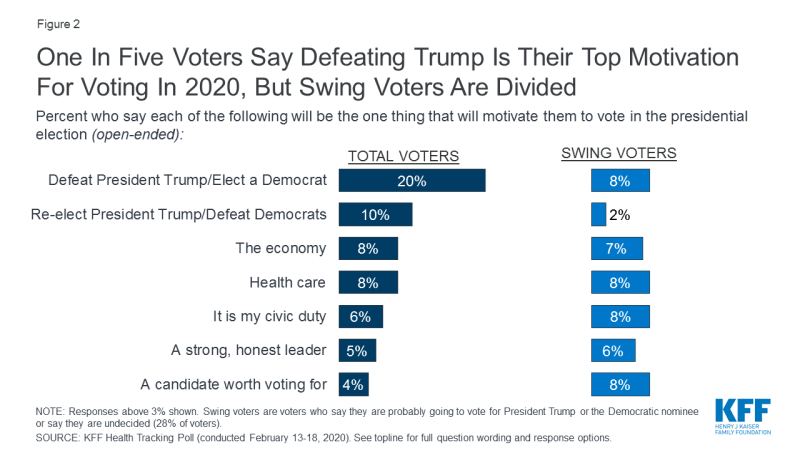
Figure 2: One In Five Voters Say Defeating Trump Is Their Top Motivation For Voting In 2020, But Swing Voters Are Divided
As expected, the role that President Trump is playing in voters’ minds is largely party-driven with four in ten Democratic voters (39%) and 16% of independent voters offering responses related to defeating President Trump and electing a Democrat as their top motivation, while 28% of Republican voters mention re-electing President Trump or defeating Democrats as their top motivation.
With less than two weeks until March 3rd, when 11 states will hold their Democratic primary contests or caucuses, the latest KFF Health Tracking Poll finds that two groups that are key to the Democratic nominee winning in 2020 – Democratic voters and swing voters – have different preferences on what is most important when choosing a presidential nominee for the Democratic Party.
A larger share of voters who say they are either “definitely” going to vote for the Democratic nominee in 2020, say it is most important to choose a candidate with the best chance of defeating President Trump (59%) than one who comes closest to your view on issues (39%). Swing voters who are leaning Democrat or undecided, prioritize selecting a candidate who comes closest to their views on the issues (78%) over a candidate with the best chance of defeating President Trump (18%).
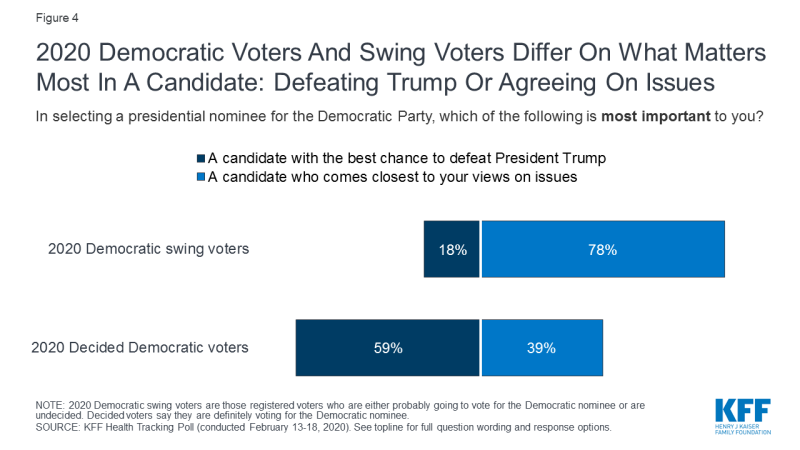
Figure 4: 2020 Democratic Voters And Swing Voters Differ On What Matters Most In A Candidate: Defeating Trump Or Agreeing On Issues
2010 Affordable Care Act
The most recent KFF Health Tracking Poll finds 55% of the public now favoring the 2010 Affordable Care Act (ACA) – marking the highest overall favorability recorded since KFF began tracking it in April 2010. This slight uptick is largely driven by a continued support among Democrats with 85% now expressing favorable views compared to 53% of independents and 18% of Republicans. A majority of Republicans (77%) continue to hold unfavorable views towards the law.
The role that the Affordable Care Act is playing during the 2020 presidential election is quite different than how it was in 2016, especially among Republican voters. While most Republican voters (84%) hold unfavorable views towards the ACA, few offer it when asked to say in their own words what about health care is important to their vote. Three percent of Republican voters offer opposition to or repealing the ACA as their top health care issue in the most recent KFF Tracking Poll. This is a considerable decrease from the 2016 presidential election, during which three in ten (29%) Republican voters offered it as their top health care issue. It is also a decline from the 2018 midterm elections in which 18% of Republican voters mentioned opposition to the ACA or repealing the ACA as their top health care issue.
Now when voters are asked to say in their own words what is it about health care that is important to their vote, Republican voters are more likely to mention health care costs (24%), opposition to single-payer or Medicare-for-all (19%), or increasing access to health care (15%).
Health care costs are also important to Democratic voters (24%) and independent voters (24%); however, a similar share of Democratic voters and independent voters offer responses related to increasing access (32% and 20%, respectively).
Health Care In The Democratic Primary: Medicare-for-all and Public Option
One of the major health policy stories of the 2020 Democratic presidential campaign has been the divide between the top candidates on proposals to expand the public health insurance program in this country. KFF has been tracking public opinion on both a national health plan, sometimes called Medicare-for-all, as well as more incremental changes such as an optional government-administered health plan, sometimes called a public option. About half (52%) of the public favor a Medicare-for-all plan in which all Americans would get their insurance from a single government plan, while two-thirds favor a public option that would compete with private health plans and be available to all Americans.
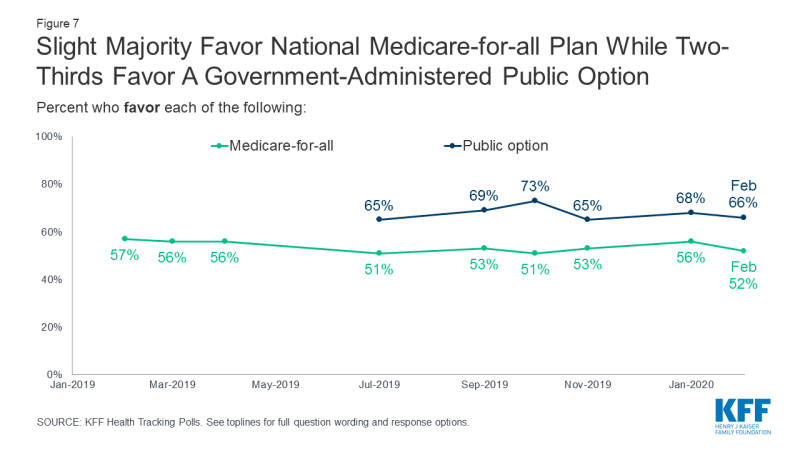
Figure 7: Slight Majority Favor National Medicare-for-all Plan While Two-Thirds Favor A Government-Administered Public Option
Four in ten Americans (43%) favor both a national Medicare-for-all plan and a government-administered public option including six in ten (62%) Democrats and four in ten (43%) independents. A smaller share (17 percent) of Republicans favor both Medicare-for-all and a public option, while half of Republicans oppose both plans.
| Table 2: Support for Proposals To Expand The U.S. Public Health Insurance Program | ||||
| Total | Democrats | Independents | Republicans | |
| Only favor a national Medicare-for-all plan | 8% | 12% | 6% | 4% |
| Only favor a government-administered public option | 23 | 20 | 26 | 27 |
| Favor both | 43 | 62 | 43 | 17 |
| Oppose both | 21 | 4 | 20 | 50 |
| Don’t know/Refused | 4 | 2 | 5 | 2 |
Choosing One: Medicare-for-all or Public Option
With the 2020 Democratic primary candidates strongly debating the two proposals, this month’s KFF poll wanted to see what happens to attitudes when voters are forced to choose between a national Medicare-for-all plan and a government-administered public option. When voters who favor both a national Medicare-for-all plan and a government-administered public option (40% of all registered voters) are asked which proposal they prefer, the public option retains its edge. More than four in ten voters (44%) either only favor a public option (26%) or prefer it (18%) compared to one-fourth of voters (26%) who either only favor a national Medicare-for-all plan (7%) or prefer it over a public option (20%).
A government-administered public option has the edge over a national Medicare-for-all plan among Democratic voters, independent voters, and Republican voters; however, a significant share of Democratic voters (39%) either only favor or prefer a national Medicare-for-all plan.
| Table 3: Pushed Support for Proposals To Expand The U.S. Public Health Insurance Program Among Voters | ||||
| Total voters | Democratic voters | Independent voters | Republican voters | |
| Medicare-for-all (NET) | 26% | 39% | 24% | 11% |
| Only favors a national Medicare-for-all plan | 7 | 10 | 6 | 2 |
| Prefers a national Medicare-for-all plan | 20 | 29 | 19 | 9 |
| Public option (NET) | 44 | 51 | 45 | 32 |
| Only favors a government-administered public option | 26 | 22 | 30 | 27 |
| Prefers a government-administered public option | 18 | 29 | 15 | 5 |
| Refused to choose | 3 | 4 | 3 | 1 |
A government-administered public option also holds the advantage over a national Medicare-for-all plan among Democratic voters (51% v. 39%), independent voters (45% v. 24%), and swing voters (49% v. 25%).

